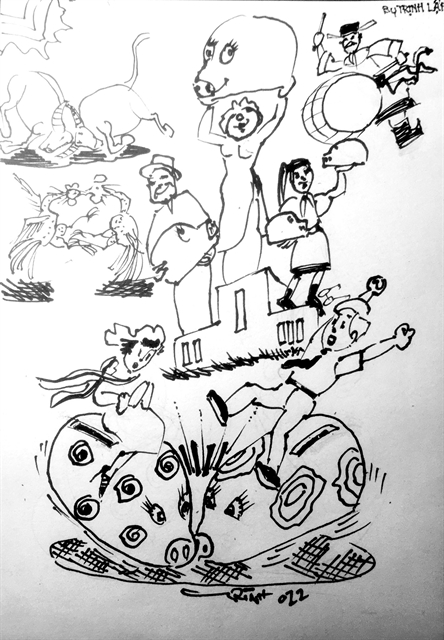 Talk Around Town
Talk Around Town

By An Phương
Very few people will argue that saving for a rainy day is not practical and prudent.
Even as children we have heard the story about the ant and the grasshopper, the former working hard and saving food for winter while the latter mocks him and “enjoys life in the moment”.
There’s no argument then, that saving is a sensible course to chart, the earlier, the better. But, how do we save effectively?
In recent discussions I have had on this topic with friends in the “prime of their life”, that is, aged 19-31, there was one general agreement that looked counter-intuitive at first glance.
The general agreement was that there are times it pays to spend more money on certain items, instead of going for the cheapest option.
 |
| Illustration by Trịnh Lập |
Ngọc Anh, 28, began her savings journey as soon as she received her first paycheck with a tech firm. She lives a frugal lifestyle, rarely treating herself to new clothes or makeup.
“I would like to retire early and be the independent woman I have always wanted to be. I know this lifestyle might seem extreme but I have made peace with it. I am determined to purchase my first house before turning 30 so that my mother will be less worried about me,” she says.
Even frugal Anh says it made sense to pay more at times for some products.
“I’ve never regretted paying more up front for quality,” she says. “It’s much better to have a few quality items than a ton of mediocre quality stuff cluttering our house.
“I usually spend more on electrical appliances, including washing machine, fridge and air conditioner as they usually come with energy saving options, which will help me save a lot more in monthly electric bills.” she explains.
The cheapest product on the shelf probably has low shelf life, so it’s better to pay more in the first place for a product that’s built to last, she reiterates.
I can’t agree more. I usually do some research before making a purchase to ensure I get the most bang for my buck, and this could mean a more expensive, better quality product.
But I was not always like this. I used to save money by spending as little as possible, but several impromptu purchases on non-essentials here and there add up to a huge sum in the long run. There were months when I couldn’t save a single đồng for emergency tasks with such shopping habits.
Danh Tú, 25, says it is crucial to keep an eye out for annual sales and seasonal mark-downs, as well as rewards programmes that credit cards offer.
“I know how irritating it might feel for a saver to splurge on expensive items but if we look at the bigger picture, it is, in fact, one of the most sustainable ways of saving money.
“For instance, one purchase that I am proud of is a mattress for more than VNĐ15 million. As expensive as it seems, the top-of-the-line of mattress ensures I am fully rested and rejuvenated each day for the grind ahead,” Tú says, adding that he does not have to think about the mattress topic anymore.
“Buy nice, or buy twice,” he quips.
One inescapable aspect of saving and spending money is being realistic about the urgency and influence of the item on daily life.
Thu Thảo, 31, says she has set up separate savings accounts, one for an emergency fund and the other for purchases like vacations or big-ticket items.
The mother of two says her lifestyle has completely changed since the day she got married.
“I have a family to take care of and feel we are better off well prepared for unfortunate incidents, especially in the post COVID-19 era,” she says.
“I used to buy new bags every month but that’s a thing of the past. Before my big day, I decided to buy my dream designer bag as a wedding gift to myself. It was expensive but since then I have stopped looking for other alternatives.
“Sticking to an item that we know we will love for the long haul helps me save money for other things in life.”
As a fashion lover myself, this resonates. New clothes and bags take up a huge part of my monthly spending, but I have learnt that fashions come and go, We should spend more only when we know we’re really getting long-term value for our money.
Ngọc Phước, 19, says she is learning to be more mindful about spending. She says she is practising realistic budgeting. She used to note down details of her spending in a little notebook and found it overwhelming. Now with the help of various financial mobile apps, Phước’s money management has improved considerably.
“I try to make my own coffee and bring to school. I used to buy coffee every day without realising 30 cups per month can add up to an unimaginable sum of money. I recently purchased a coffee maker during the 11.11 sales campaign and was surprised at how good home-brew coffee can be.”
It takes some strict discipline, of course, but my friends and I have ended up agreeing that wisely spending more in the short term enables long term savings. VNS




